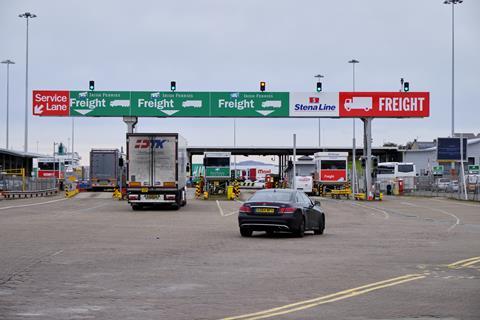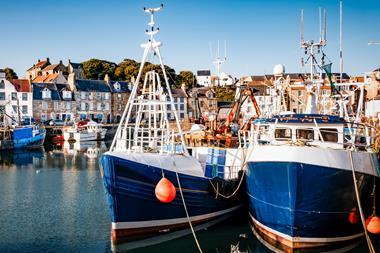
A weeks-long closure of Holyhead port in north Wales is still affecting trade between the UK and Ireland – despite claims from owners that it can operate at full capacity.
Holyhead, one of Britain’s busiest ports and the main gateway from GB to Dublin, was damaged during Storm Darragh in early December, causing significant disruption to deliveries ahead of the crucial Christmas period.
The port partially opened on Thursday – but only one of the two ferry berths that were damaged.
The Grocer understands the “more damaged” berth will not be functioning before March, which is causing concern across the supply chain.
Irish Road Haulage Association president Ger Hyland said the reopening would relieve many of the challenges hauliers had faced in recent weeks, but he dubbed it a “temporary fix” until all berths are up and running.
Stena Line, which owns Holyhead port as well as operating some of the crossings, is insisting the port is able to operate at full volume by operating alternative schedules. But trucks arriving from Dublin this morning were still delayed by several hours, Hyland said.
Prior to the large infrastructure damage, around 1,200 lorries and trailers made the journey from Wales to Dublin each day via Holyhead.
One cold chain business reported the situation of recent weeks as “basically nigh-on crippling traffic across the Irish Sea, with all boats oversubscribed, trailers stuck for multiple days on either side of the water”.
Additionally, RHA members have reported being hit with surcharges from ferry operators operating alternative GB-Ireland routes due to higher demand and tightened slot availability.
Read more: Christmas trade disruption continues as Holyhead port closed for longer
Several RHA members in Northern Ireland have reported that ferry operator CLdN (formerly Seatruck) has introduced surcharges to hauliers using their services, the trade association said.
RHA said it was investigating the issue as it was ”concerned about the strain of this pricing on the supply chain between GB and Northern Ireland, given the dominant position CdNL operates under via its routes between Warrenpoint/Dublin and Heysham, and Dublin and Liverpool”.
“We understand they’ve launched a new system where operators using more than their standard booking allocations have to pay 100% surcharge on additional slots.
“Our members tell us that the allocated standard booking slots fall significantly short of average weekly shipping volumes to meet demand, which effectively doubles the cost of essential shipping services.
”They further report that these surcharges are only being notified at the time of booking, providing no opportunity for strategic planning or alternative arrangements.”
Speaking on RTE’s Morning Ireland, Hyland said: “It’s a start. Hopefully it’ll stay going but it just goes to show how fickle the thing is. If it goes down again we’re in an unholy mess.”
The Irish and Welsh governments are expected to launch a new taskforce to ensure they are prepared in case a similar situation arises in the future.



















No comments yet